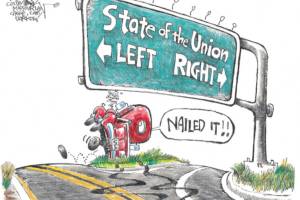U.S. loss of influence becomes more apparent in Middle East
Published 4:36 pm Friday, May 30, 2008
WASHINGTON — What happens when a superpower becomes preoccupied by a costly war and loses some of its ability to coerce friends and enemies toward the outcomes it favors? We’re seeing a demonstration of that change now in the Middle East, as Arabs and even Israel reckon with the limits of American power — and begin to cut their own deals.
The new power dynamic is clear in two developments over the past several weeks — the Lebanon peace deal brokered by Qatar on May 21, and the Israel-Syria peace talks, with Turkish mediation, that were announced the same day. Both negotiations could help stabilize the region, albeit not on the terms the U.S. would have preferred.
This independence from American tutelage is arguably one advantage of the new diplomacy: It is grounded in realism among the Middle Eastern nations about their own interests, rather than in wishful thinking about what the United States can accomplish. It reflects, as well, the growing strength of Iran and its radical allies, and the diminished clout of the United States — and in that sense, it accords with the altered balance of power in the area.
The best explanation I’ve seen of this rebalancing came from veteran Arab journalist Rami Khouri in the Beirut Daily Star. “We are witnessing the clear limits of the projection of American global power, combined with the assertion and coexistence of multiple regional powers (Turkey, Israel, Iran, Hezbollah, Syria, Hamas, Saudi Arabia, etc.),” he wrote. This new alignment, he added, “is not a full defeat for the United States — it’s more like a draw.”
The Lebanon peace deal negotiated in Doha is a classic piece of Arab diplomacy — a compromise that straddles disparate factions and deep hostilities for the sake of expediency. The Qataris who brokered the deal are themselves a walking embodiment of all the region’s contradictions. As Nicholas Blanford noted in The Christian Science Monitor, Qatar is chummy with Iran and at the same time hosts the biggest U.S. air base in the Persian Gulf; it has open links with Israel and also sponsors the anti-Israel polemics of al-Jazeera.
Qatar stepped in to mediate after Hezbollah had defied America and its allies and taken control of West Beirut in a naked display of power. Recognizing that U.S. efforts to check the radical militia had failed, the Lebanese did the pragmatic thing — they sued for peace under the formula the Bush administration has been resisting for more than a year. The Qatari compromise broke the logjam at last: Lebanon has a new president and an agreement for elections next year. Even some senior administration officials aren’t all that unhappy with this outcome.
The Syria-Israel dialogue through Turkey is another example of Middle East realpolitik. It illustrates that when it comes to protecting its own interests, even America’s closest ally in the region is going its own way.
The American-Israeli split on Syria has been widening for the past several years. One point of difference was what to do about the nuclear reactor the Syrians were secretly building at Al Kibar, in the northeastern desert, with help from North Korea. The Bush administration wanted to confront the Syrians last year with the intelligence and use the issue to pressure them to dismantle the facility. The Israelis decided they couldn’t wait — and bombed the suspected reactor site on Sept. 6, 2007.
The United States feared the Israeli attack might trigger a wider war, and insisted on American-Israeli silence to avoid humiliating Syrian President Bashar Assad. In the end, the Israelis were right in their prediction that Syria wouldn’t retaliate. Instead, according to U.S. intelligence, the Syrians scrambled to hide traces of the reactor they had secretly been building.
The Bush administration was dubious about the Turkish negotiating channel, just as it had balked at the bombing. But here again, the Israelis ignored their superpower patron. They want to exploit tensions between Syria and Hezbollah, open at least a small gap between Syria and Iran — and in the process enhance the clout of Turkey as a alternative to a rising Iran. In this intricate dance, Washington has been essentially irrelevant.
America isn’t withdrawing from the Middle East, despite its recent difficulties — that’s an Iranian fantasy. And in the long run, it’s surely to America’s advantage if regional powers can create a stable security architecture — even if it isn’t precisely the one we would have designed for them. We’ve tried imposing our own solutions, and frankly that hasn’t worked very well.
David Ignatius is a Washington Post columnist. His e-mail address is davidignatius@washpost.com.




